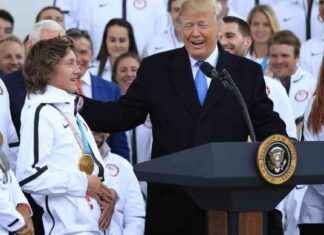The Cuban president, Miguel Díaz-Canel, chose the best possible place, the Vatican, to present his son to society, with papal approval included, in the loving presence of Lis Cuesta, his mother. “Work with me,” the one chosen by Raúl Castro to continue the Cuban revolution proudly stressed. But yes, the president clarified that his son “is the opposition of the family, the one who criticizes the most”, to the irritation of the true opposition and dissidents, imprisoned and persecuted on the island.
Miguel Díaz-Canel Villanueva, just turned 30, thus joins the club of the chosen ones, the children of the dictators of the Americas, headed by Laureano, the first-born of the Sandinista leader Daniel Ortega and the main favorite for his succession. And he does so a decade after the brilliant emergence of Nicolasito Maduro Guerra, son of the people’s president, who as soon as he came to power placed his only son in positions of maximum trust and responsibility despite his lack of resume and experience.
Díaz-Canel junior, in addition to having a law degree, leads the alternative music band D’Cuba. Thanks to his closeness to power, he now dares to give advice to the citizens of the island: “My advice is to always work, because we have one of the most privileged jobs in the world. It is up to us to save music, art, cinema that we make and put it in function of the growth of the country”.
The autocrats of the Americas rely on their families, who are part of the power. This has been demonstrated once again by Nicolasito Maduro, who accompanies his parents on the momentous trip to China. “The son of the Venezuelan dictator has been occupying positions within the high leadership of the Bolivarian revolution, in his father’s time, in such a gradual and constant manner and that could be, in the future, one of the best case studies of nepotism in a Latin American authoritarian regime,” sociologist Gianni Finco, one of the main experts in the analysis of Chavista propaganda, shoots for LOC.
Currently, Maduro Jr is a deputy of the Bolivarian legislative body and vice president of religious issues of the United Socialist Party of Venezuela (PSUV). At just 33 years old, he has already presided over relevant investigations, such as the one mounted with the military to exonerate the ruling party of the corruption unleashed with the million-dollar unfulfilled works of the Brazilian construction company Odebrecht. Maduro also placed his son in charge of the Villa del Cine thanks to his artistic gifts: he learned to play the flute in the prestigious Venezuelan Orchestra System.
Currently, Maduro Guerra, in addition to working side by side with his father and the vice president, Delcy Rodríguez, is part of the parliamentary commissions linked to the agreements with China and the implementation of special economic zones, “some responsibilities that place him, at the same time, in front of the voting masses of Venezuelan evangelicals and Catholics and in the political watchtower that educates, prepares and trains him to understand his father’s diplomatic and economic policies,” Finco notes.
“The nepotism that his figure embodies is at the same time a consequence of an ecosystem of power without institutions, in eternal mutation and transformation to guarantee the stability of the regime and the symptom of an eternally paranoid power, which can only trust its inner circle. close, sometimes defined by blood ties,” he concludes.
The debate about a possible succession in the future between the Maduros does not go beyond political jokes that appear from time to time. The situation is very different in Managua, where Laureano, eldest son of the marriage between Ortega and the co-president, Rosario Murillo, has put aside his musical ambitions (he is a discreet opera singer), to become the favorite to succeed his father within the scheme of hereditary revolution that the Nicaraguan leader intends to impose. Ignoring, of course, Murillo’s presidential desires.
“He could be considered a kind of de facto chancellor, especially because he is the main representative of the dictatorship in its relations with China and Russia, which are the regime’s main bet to stay in power,” the student leader confirms to LOC. Douglas Castro.
The big question is how Laureano would behave beyond the umbrella of his parents, “especially in matters of control of the Armed Forces, the Police and the intelligence apparatus. Although he seems to be the designated heir, his ability to successfully assume the legacy of his family is far from safe,” Castro says.







